
Palaeontographica Abteilung B-Palaeophytologie Palaeobotany-Palaeophytology
Scope & Guideline
Illuminating the Evolutionary Pathways of Plants
Introduction
Aims and Scopes
- Palaeoecological Studies:
Research that investigates the interactions of ancient plant species within their ecosystems, including their roles in past environments and climate changes. - Morphological and Anatomical Analysis:
Detailed studies on the structure of fossilized plants, including leaf cuticle analyses and stem morphology, which help in understanding evolutionary trends and adaptation mechanisms. - Taxonomy and Systematics of Fossil Flora:
Systematic classifications and revisions of ancient plant species, contributing to the understanding of plant diversity and phylogenetic relationships over geological time. - Palaeoclimatic Implications:
Research that explores the climatic conditions of historical periods based on fossil plant evidence, providing insights into past climate change and its impact on flora. - Regional Palaeobiogeography:
Investigations into the geographical distribution of ancient plant species, offering insights into the biogeographical patterns and ecological dynamics of past environments.
Trending and Emerging
- Cuticular Analysis and Leaf Morphology:
An increase in studies employing cuticular analysis to understand ancient plant species’ adaptations and responses to environmental changes, reflecting a growing interest in plant physiology and its implications. - Exceptional Fossil Lagerstätten:
Research focusing on exceptionally preserved fossil sites, such as lagerstätten, is gaining traction, as they provide invaluable insights into biodiversity and ecological interactions in ancient environments. - Palaeoecological Interactions:
Emerging studies are increasingly concentrating on the interactions between ancient flora and fauna, as well as their roles in ecosystems, indicating a trend towards a more holistic understanding of past life. - Climate Change Implications:
A growing emphasis on the implications of fossil findings for understanding past climate changes, which is becoming increasingly relevant in the context of contemporary climate issues. - Technological Advances in Palaeobotany:
The integration of new technologies, such as SEM (Scanning Electron Microscopy) and advanced imaging techniques, is emerging as a trend, enhancing the quality and depth of palaeobotanical research.
Declining or Waning
- Focus on Lower Paleozoic Flora:
There has been a noticeable decrease in studies specifically dedicated to Lower Paleozoic plant species, suggesting a shift towards later geological periods that offer richer fossil records. - Generalized Palynology Studies:
While palynology remains important, the papers focusing on generalized pollen and spore studies without specific ecological or evolutionary context have become less frequent. - Basic Morphological Descriptions:
Research that solely provides basic morphological descriptions of fossil plants without deeper analysis or implications for ecosystem dynamics seems to be declining.
Similar Journals

PLANT SYSTEMATICS AND EVOLUTION
Unveiling the Mysteries of Plant DiversityPlant Systematics and Evolution is a prestigious journal published by Springer Wien, dedicated to advancing research within the fields of plant taxonomy, evolution, and ecology. With its ISSN 0378-2697 and E-ISSN 1615-6110, this journal has been pivotal in shaping the scientific landscape since its inception in 1974. Based in Austria, it occupies a significant position in the academic community, being ranked in the Q2 quartile in both Ecology, Evolution, Behavior and Systematics and Plant Science as of 2023. This high-impact journal is recognized for its rigorous peer-review process and is indexed among the top publications in its category, holding a Scopus rank of #176 out of 516 in Plant Science and #252 out of 721 in Ecology, highlighting its relevance and quality in the research community. Although it does not currently offer open access, the journal is committed to making significant contributions to the understanding of plant biodiversity and evolutionary processes. This makes it an essential resource for researchers, professionals, and students aiming to know the latest developments in the study of plant systematics and evolution.
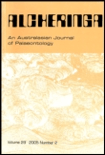
ALCHERINGA
Illuminating the Path of Scientific DiscoveryALCHERINGA, published by Taylor & Francis Ltd, is a distinguished academic journal that has been at the forefront of research in the fields of ecology, evolution, behavior, systematics, and paleontology since its inception in 1975. With an ISSN of 0311-5518 and E-ISSN 1752-0754, this journal serves as a critical platform for the dissemination of high-quality research, contributing significantly to the understanding of biological and geological sciences. Ranking in the Q3 quartile for both Ecology, Evolution, Behavior and Systematics, as well as Paleontology, ALCHERINGA is well-positioned within the academic community, attracting submissions from researchers across the globe. The journal's Scopus ranks further highlight its relevance, particularly its position in the 51st percentile for Ecology and the 50th percentile for Paleontology. Although it does not operate under an open access model, ALCHERINGA remains committed to providing valuable insights and fostering discussions that are essential for the advancement of these vital scientific disciplines. Researchers, professionals, and students are encouraged to explore the profound implications of the studies published within, making it an indispensable resource for anyone aiming to deepen their expertise in these fields.

PALAEONTOLOGIA ELECTRONICA
Connecting Researchers to the Rich Tapestry of Earth's HistoryPALAEONTOLOGIA ELECTRONICA is a distinguished open-access journal published by COQUINA PRESS, offering a vital platform for the dissemination of cutting-edge research in the fields of Paleontology and Oceanography. Launched in 1998, this journal has continuously fostered scholarly communication, allowing unrestricted access to scientific findings and contributing significantly to the advancement of the field. With an impressive track record since its inception, PALAEONTOLOGIA ELECTRONICA holds a 2023 Scopus ranking of #39 out of 113 in the Paleontology category, demonstrating its value among academic resources as evidenced by its Q2 quartile ranking. The journal is based in the United States, and it encourages submissions that span a diverse range of topics, from fossil analysis to evolutionary biology. As a prominent resource for researchers, educators, and students alike, it plays a crucial role in shaping the future of paleontological study.

BOTANICAL REVIEW
Connecting past discoveries with future innovations in botany.BOTANICAL REVIEW is a highly esteemed journal published by SPRINGER, renowned for its commitment to advancing the fields of Ecology, Evolution, Behavior and Systematics and Plant Science. Established in 1935, this journal has become a cornerstone for researchers and professionals, reflecting over eight decades of rigorous scholarship. With an impressive impact factor and ranking within the top quartile for both its fields—Q1 in Ecology, Evolution, Behavior and Systematics and Plant Science—BOTANICAL REVIEW remains a key platform for disseminating critical findings and fostering scientific dialogue. Although it is not an open-access journal, its accessibility through institutional subscriptions enhances its reach among the academic community. The journal not only emphasizes the ecological aspects of plant life but also integrates evolutionary context to inform current practices and theories in botany. With a dedication to exploring the complex interactions within botanical sciences, BOTANICAL REVIEW continues to shape the future of plant research.
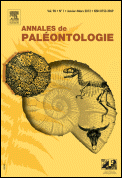
ANNALES DE PALEONTOLOGIE
Illuminating the Fossil Record for Tomorrow's ScientistsANNALES DE PALEONTOLOGIE is a distinguished academic journal published by MASSON EDITEUR that plays a pivotal role in the field of paleontology. With an ISSN of 0753-3969 and an E-ISSN of 1778-3666, this journal has been a vital resource since its inception in 1988, continuously contributing to the advancement of knowledge in Earth and Planetary Sciences, particularly focusing on paleontological research. Currently ranked #68 out of 113 in its category by Scopus, and celebrated for its Q2 quartile standing, ANNALES DE PALEONTOLOGIE publishes innovative studies, reviews, and discussions that appeal to a diverse audience of researchers, professionals, and students. The journal aims to foster a deeper understanding of paleontological phenomena and encourages interdisciplinary collaboration within the scientific community. Although it is not an open access journal, its commitment to scholarly excellence ensures that the content is highly regarded and widely referenced in academic circles. Situated in Issy-les-Moulineaux, France, it continues to maintain a global readership while promoting significant advancements in paleontological research.

Stratigraphy
Bridging Geological Time with Fossil InsightsStratigraphy is a distinguished journal dedicated to advancing the field of paleontology and stratigraphic research. Published by MICRO PRESS in the United States, this journal is accessible via its ISSN 1547-139X and E-ISSN 2331-656X, providing an essential platform for researchers, professionals, and students alike. With a robust focus on the intricate relationships between geological time and the fossil record, Stratigraphy aims to disseminate high-quality research that enhances our understanding of Earth’s history. Its ranking within the 2023 Q2 category of paleontology reflects its commitment to scholarly excellence, as noted by a Scopus ranking of #65 out of 113 in the Earth and Planetary Sciences domain, placing it in the 42nd percentile. Although not open access, the journal's valuable contributions from 1988 to 2024 encourage a collaborative dialogue among the scientific community, underscoring the significance of stratigraphic studies in environmental and evolutionary research.
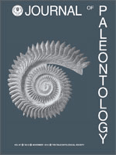
JOURNAL OF PALEONTOLOGY
Illuminating Evolutionary Journeys Through TimeJOURNAL OF PALEONTOLOGY, published by Cambridge University Press, is a leading scholarly journal dedicated to the field of paleontology, featuring a broad scope that covers fossil studies, evolutionary biology, and earth history. With an ISSN of 0022-3360 and an E-ISSN of 1937-2337, this esteemed journal serves as an essential platform for researchers, professionals, and students to disseminate cutting-edge research findings and insights in paleontological science. The journal holds a significant position within its category, ranking Q2 in the 2023 quartiles and achieving a Scopus rank of #51 out of 113 in Earth and Planetary Sciences – Paleontology, placing it in the 55th percentile of its field. Although it does not currently offer open access options, JOURNAL OF PALEONTOLOGY has been a critical contributor to advancing knowledge from its inception in 1979 through to 2024. Its dedication to rigorous research ensures it remains an indispensable resource for those vested in the understanding of ancient life and ecosystems.

JOURNAL OF THE PALAEONTOLOGICAL SOCIETY OF INDIA
Illuminating the Fossil Record with Scholarly ExcellenceThe JOURNAL OF THE PALAEONTOLOGICAL SOCIETY OF INDIA, published by SAGE PUBLICATIONS INDIA PVT LTD, stands as a significant resource in the field of paleontology, dedicated to disseminating high-quality research and findings from the Indian subcontinent and globally. With an ISSN of 0552-9360, this journal has established itself within the academic community, particularly as it converges its publication years from 2011 to 2024. Ranking in the Q4 category of paleontology as of 2023, it serves an essential niche for researchers and students interested in the historical biological records and evolutionary processes. Despite its current Scopus ranking of #88 out of 113 in the Earth and Planetary Sciences category, the journal plays a pivotal role in fostering scholarly dialogue and advancing the understanding of paleontological sciences in India and beyond. Researchers are encouraged to contribute to this evolving field and share their findings, solidifying the journal's commitment to highlighting significant paleontological research contributions.
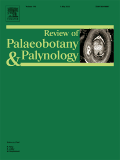
REVIEW OF PALAEOBOTANY AND PALYNOLOGY
Decoding the Legacy of Plant LifeREVIEW OF PALAEOBOTANY AND PALYNOLOGY, published by Elsevier, stands at the forefront of research in the fields of paleobotany and palynology. Since its inception in 1967, this esteemed journal has provided a vital platform for disseminating cutting-edge findings and comprehensive reviews that explore the intricate relationships between plant evolution, fossil records, and environmental changes. With its impressive categorization, being ranked Q1 in Paleontology and Q2 in Ecology, Evolution, Behavior and Systematics, it is recognized as a leading outlet for scholars, boasting a notable impact factor that underscores its influence within the academic community. Based in the Netherlands, the journal features a diverse range of open access options, although subscription models are also available, making it accessible to a broad audience of researchers, professionals, and students eager to delve into the complex histories of plant life. The REVIEW OF PALAEOBOTANY AND PALYNOLOGY not only champions original research but is also committed to enhancing interdisciplinary dialogue, thereby playing a crucial role in advancing our understanding of Earth's biological heritage from an evolutionary perspective.
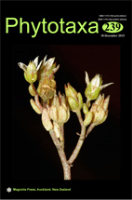
Phytotaxa
Fostering Global Insights into Plant EvolutionPhytotaxa, published by MAGNOLIA PRESS, is an esteemed journal in the fields of Plant Science and Ecology, Evolution, Behavior and Systematics. Established to cater to the growing need for high-quality research dissemination in botany, this journal presents the latest findings in plant taxonomy, systematics, and biodiversity. With its H-Index reflecting significant academic influence, and recognized as Q2 in Plant Science and Q3 in Ecology by Scopus, it stands as a reputable source for scholars and practitioners alike. The journal operates without open access restrictions, allowing for a wider reach to its audience. Positioned in New Zealand, Phytotaxa has been pivotal since its inception, contributing to the global understanding of plant diversity and ecology from 2010 to 2024. Its rigorous peer-review process ensures the high quality of published articles, making it an essential resource for researchers, professionals, and students dedicated to advancing the field of botany.